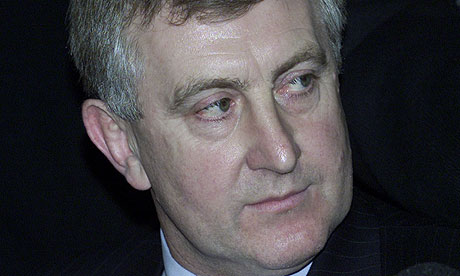
After months of infighting and crisis within the Rugby Football Union another battle could be on the horizon over moves to have Jeff Blackett, the chief disciplinary officer, removed from the RFU council.
Blackett, who chaired an inquiry earlier this year that published a report that was critical of governance at Twickenham, has been chief disciplinary officer since 2003. His report into the circumstances that led to the appointment and sacking of John Steele as RFU chief executive, submitted to the council in July but only made public 10 weeks later, led indirectly to the resignation last week of Martyn Thomas as acting chief executive and chairman of the body that will organise the 2015 World Cup.
The RFU's board of directors has made a number of submissions to Slaughter and May, the law firm that was asked after the Blackett report to look at how the RFU was run and to make suggestions for reform. One submission is that the chief disciplinary officer be removed from the council. Slaughter and May is expected to deliver its recommendations next week, before a board meeting on 30 November and a council gathering on 2 December that will vote on the proposed changes. If Blackett, a co-opted member of the council, is removed from the decision-making body it will undermine his position.
"This is nothing more than an attempt by some on the board to get revenge on Jeff Blackett because of what happened last week," said an RFU insider. "They seem to forget that at the last meeting of the council last September they all stood up and apologised for the way the Blackett report had shown they had acted. They did not contradict the evidence and even Martyn Thomas accepted the report was not a witch-hunt. Those on the board who are looking to remove Blackett should be very careful because their own positions are far from secure and the clubs have faith in him."
Following the conclusion of the Blackett inquiry, there was a debate among the board of directors over whether the role of the chief disciplinary officer should be assumed by the legal department at Twickenham. When the board decided to investigate allegations of misconduct by England players at this year's World Cup, the head of the RFU legal department, Karena Vleck, was given the job instead of Blackett, who has led inquiries before, notably in 2008 after allegations of sexual assault were made during a trip to New Zealand.
"A key reason that Jeff Blackett chaired the inquiry panel into the Steele affair was that he was a member of the council and when the decision was made to get answers to various questions about what happened over Steele, he was on the spot to take charge," said the RFU source. "He and his four panel members went into the investigation with open minds. What they discovered appalled them and they quite rightly brought everything to the attention of the council."
Thomas, whose resignation was accepted by the board last week, will remain as acting chief executive until 16 December. His contract ends on 10 December but he will carry on because, as one of the RFU's International Rugby Board representatives, he will be at the meeting in Singapore that will decide the next IRB chairman.
Bill Beaumont, a co-opted member of the RFU board, is challenging the current IRB chairman, Bernard Lapasset. A meeting in Auckland last month failed to resolve the issue, with the pair locked at 13 votes each, although one member of a federation of unions had ignored his mandate and voted for Beaumont. Thomas's last task as an RFU official will be to help deliver victory for Beaumont.
Cardiff Blues announced on Monday that they had reached a compensation agreement with Wasps over David Young, who left the Welsh region last summer while under contract to take charge at Adams Park.

